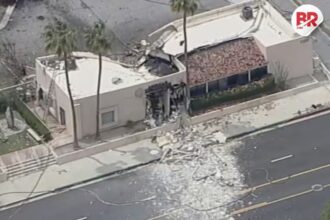
In the aftermath of the tragic Pahalgam attack, Prime Minister Narendra Modi has made it clear: India is no longer on the defensive.
With 26 innocent lives lost, Modi’s swift response shows that India is ready to rethink its entire security approach. It’s not just about protecting borders anymore—it’s about redefining national security for the 21st century.

While India has always been a nation of resilience, the recent attack has pushed the government to act faster, smarter, and stronger.
And now, the Defence Secretary plays a key role in shaping India’s future security policies. Together with PM Modi, they are setting a course that ensures India stands tall, ready to face any threat, whether from across the border or from within.
The Defence Secretary: Leading the Charge
The Defence Secretary has never been more important. This meeting with PM Modi isn’t just about reacting to the Pahalgam attack—it’s about preparing for the future. The Defence Secretary’s influence in shaping policy is crucial as India adapts to emerging threats.
Key points discussed in the meeting were:
- Better Intelligence: PM Modi wants India’s intelligence to be more agile. Intelligence agencies are being pushed to become quicker in detecting threats in real-time.
- Stronger Borders: From the Line of Control (LoC) to international borders, India’s defense systems are being upgraded. This includes more technology, manpower, and faster responses to threats.
- Rapid Response Forces: The plan includes training and equipping specialized units to react swiftly and decisively to any attack.
- Diplomatic Engagement: Alongside military strategies, Modi’s government is looking to keep communication channels open with Pakistan and the international community. De-escalating tensions remains a priority, but India won’t back down on its sovereignty.
VIDEO | Delhi: Defence Secretary Rajesh Kumar Singh leaves after a meeting with PM Modi at 7, Lok Kalyan Marg.
The meeting comes a day after Chief of Air Staff Air Chief Marshal A P Singh met Prime Minister Modi and is understood to have discussed the security situation against… pic.twitter.com/qYe6Y1L30G
— Press Trust of India (@PTI_News) May 5, 2025
The Pahalgam Attack: A Wake-Up Call
The Pahalgam attack has shaken India, but it has also sparked change. PM Modi’s leadership is now focused on making sure that such an attack never happens again. This means:
- Stronger Counter-Terrorism: India’s counter-terrorism efforts are being revamped to stay ahead of evolving threats.
- Community Collaboration: Building trust with local communities in sensitive regions is key. PM Modi’s government is focused on improving collaboration to ensure the people on the ground help fight back against terrorism.
- Support for Victims: Families affected by the tragedy will receive full support, including financial aid and rehabilitation.
India-Pakistan Relations: Stronger, But Smart
India’s relationship with Pakistan has always been tense. The Pahalgam attack is a reminder of the complex nature of these relations.
PM Modi’s government isn’t just focusing on military readiness; it’s also exploring diplomatic options. India is ready to talk, but not at the cost of its security. There’s no room for compromise when it comes to protecting the nation.
Looking Ahead: India’s Vision for Security
PM Modi is leading India through these challenging times with a clear goal: a secure, resilient nation. His approach isn’t just about responding to attacks but proactively strengthening India’s defense system.
With the Defence Secretary’s leadership, India’s security will not just be reactive—it will be smart, strategic, and ready for the future.
India is on the rise, no longer playing catch-up. From national security to innovation, Modi’s India is setting the pace. India is ready to lead, and the world will be watching.
Also Read Pahalgam Attack Twist: Why Is Pakistan Secretly Begging Russia for Help?












